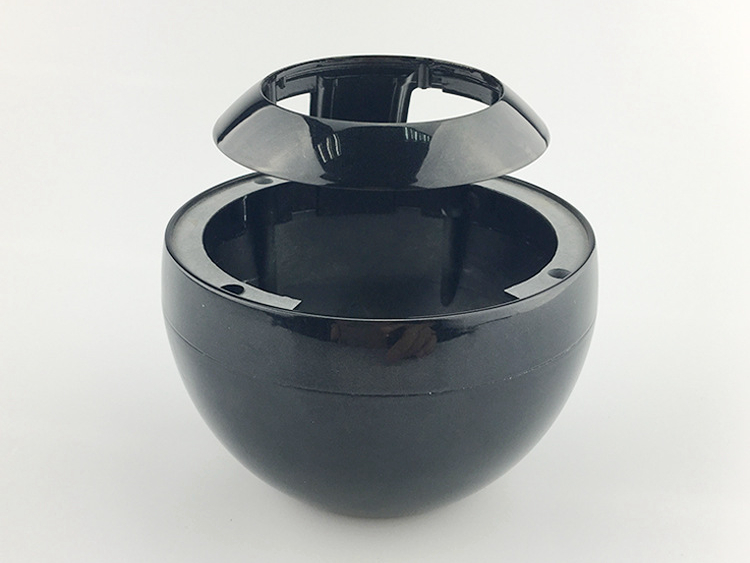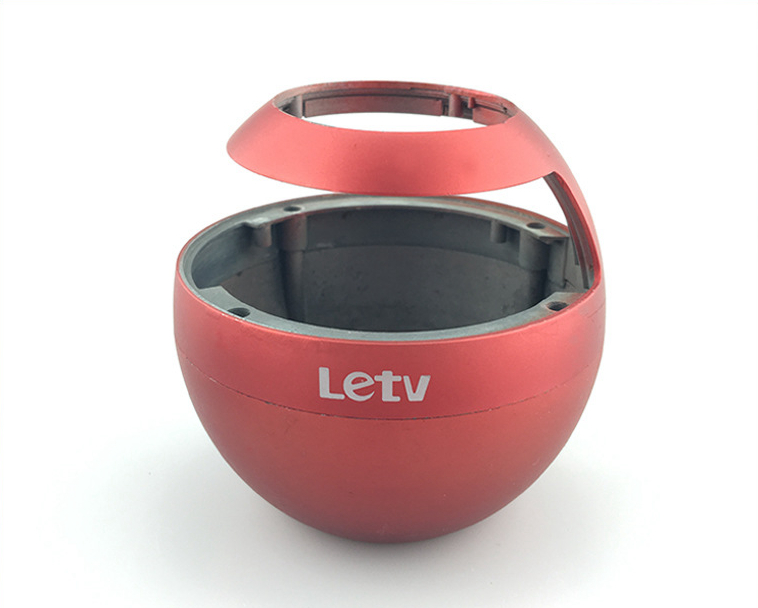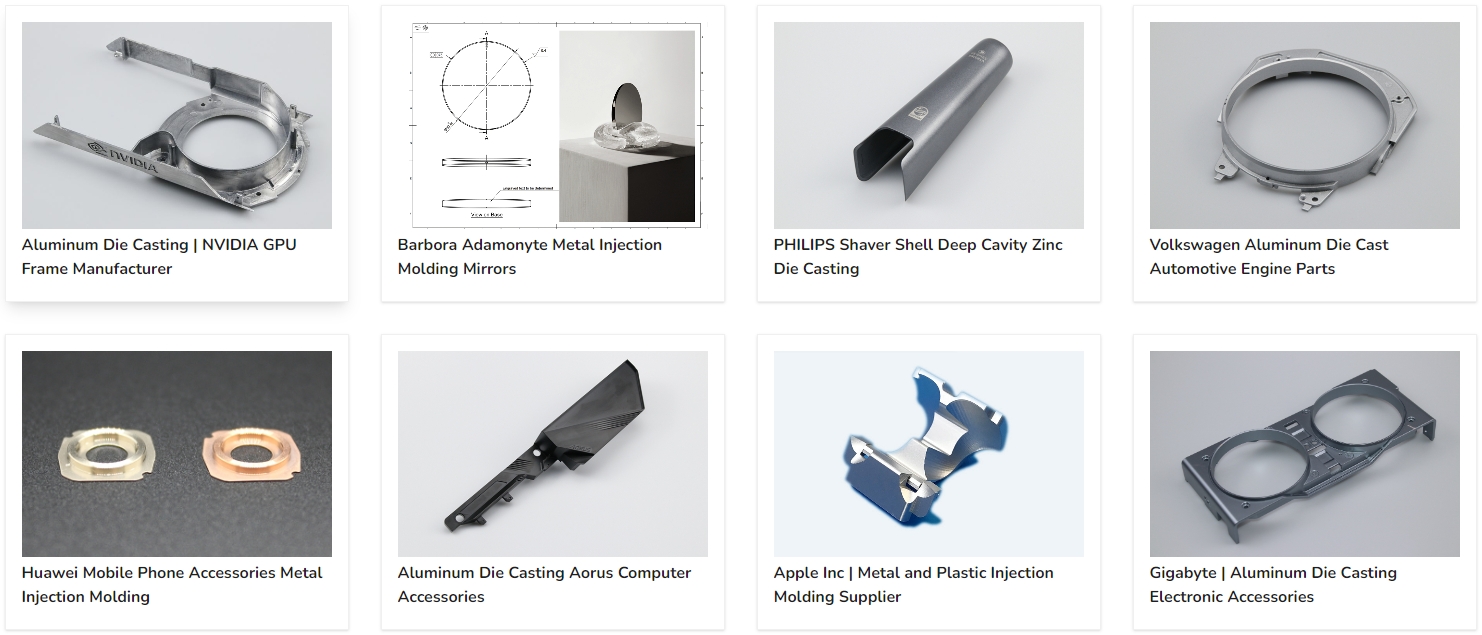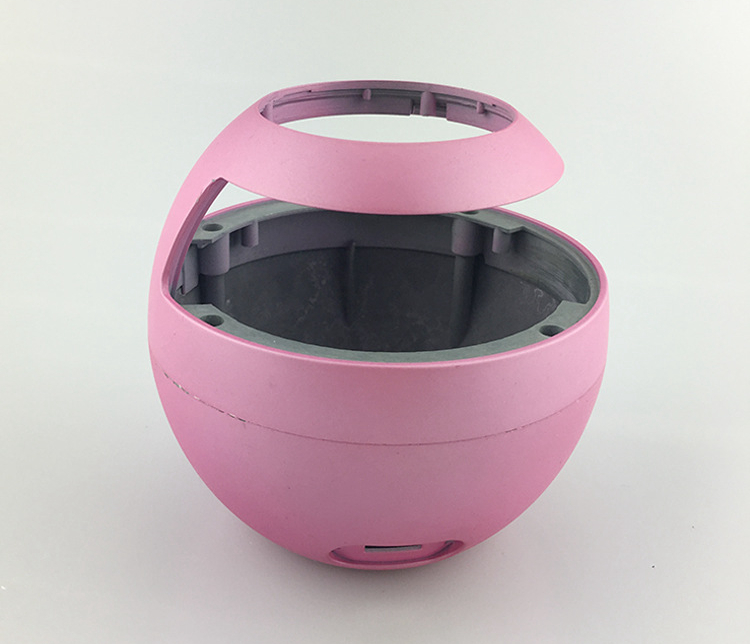Aluminum ADC 12 Die-Casting Electronic Product Housing with Painting
The demand for durable, precise, and aesthetically pleasing components is higher in the rapidly evolving consumer electronics industry. At Neway Precision, we understand the critical role of high-quality manufacturing in delivering products that meet and exceed market expectations. This case study delves into our comprehensive process for creating an aluminum ADC 12 die-casting electronic product housing with a flawless painted finish.
Our journey begins with CNC prototyping, a crucial step that allows us to refine the design and ensure all specifications are met before mass production. Utilizing aluminum die casting, we leverage the material properties of ADC 12 to achieve a balance of strength, durability, and lightweight efficiency. Post-casting, advanced CNC machining techniques, and meticulous threading and polishing processes guarantee that every component meets the stringent ISO 2768 mk tolerance standards.
Finally, the product is finished with a high-quality powder coating, providing aesthetic appeal and protective durability. Through this case study, we highlight the technical aspects of our manufacturing process, the challenges we faced, and the innovative solutions we implemented to overcome them. This project exemplifies our commitment to delivering precision-engineered solutions, reinforcing why Neway Precision is the preferred partner for high-precision manufacturing from rapid prototyping to mass production.
Technology Overview
CNC Prototyping
CNC prototyping is the first crucial step in our manufacturing process. This technique lets us create precise and functional prototypes directly from CAD models. Using CNC prototyping, we can test and refine the design, ensuring all specifications are met before moving to mass production. This step is essential for identifying and correcting potential issues early, reducing time and cost in the later manufacturing stages.
Aluminum Die Casting
Aluminum die casting is the backbone of our manufacturing process for this electronic product housing. We chose ADC 12, a widely used aluminum alloy, for its excellent balance of strength, lightweight properties, and superior castability. The die-casting process involves injecting molten aluminum into a steel mold under high pressure. This method is ideal for producing complex shapes with high dimensional accuracy and smooth surface finishes, making it perfect for the intricate designs of electronic housings.
CNC Machining
Following the die-casting process, CNC machining is employed to achieve the final shape and precise dimensions required for the product. CNC machining involves using computer-controlled tools to remove material and achieve exact specifications. This step ensures that every component fits perfectly and meets the high precision required by the ISO 2768 mk tolerance standards. The result is a product that is not only functional but also aesthetically pleasing.
Threading and Polishing
Threading and polishing are critical for ensuring that all mechanical connections are precise and secure. The threading process involves creating internal or external threads that allow components to be assembled with high precision. On the other hand, polishing enhances the surface quality, removing any imperfections and preparing the product for the final finish. These steps are vital for both the functionality and the overall appearance of the housing.
Painting
The final step in our manufacturing process is painting, specifically powder coating. This technique involves applying a dry powder to the housing surface, which is then cured under heat to form a durable and attractive finish. Powder coating offers several advantages, including excellent resistance to chipping, scratching, and fading, which is crucial for consumer electronics that require both durability and aesthetic appeal. The result is a product that meets functional requirements and stands out in the market for its superior finish and appearance.
Material and Surface Finish
ADC 12 Material Properties
ADC 12 is a versatile aluminum alloy commonly used in die casting for its excellent mechanical properties and castability combination. Known for its lightweight and high strength-to-weight ratio, ADC 12 is ideal for electronic product housings where durability and performance are critical. This alloy offers several key benefits:
High Fluidity: Ensures detailed and intricate designs can be cast without defects.
Good Corrosion Resistance: Protects the electronic components housed within from environmental damage.
Excellent Mechanical Properties: Provides the necessary strength and rigidity while keeping the component lightweight.
Dimensional Stability: Maintains precise dimensions throughout the casting process, which is essential for high-precision assemblies.
These properties make ADC 12 an optimal choice for the complex requirements of electronic product housings, ensuring both functionality and longevity.
Surface Finish - Powder Coating
We apply a high-quality powder coating finish to enhance the appearance and durability of the electronic product housing. Powder coating is a dry finishing process that offers numerous advantages over traditional liquid paints:
Durability: This creates a hard, tough finish that resists chipping, scratching, and fading. Consumer electronics need to undergo frequent handling and use.
Uniform Coverage: Ensures an even and consistent finish across all surfaces, including edges and corners, which can be challenging to achieve with liquid paints.
Environmentally Friendly: Contains no solvents and releases negligible amounts of volatile organic compounds (VOCs) into the atmosphere, making it an eco-friendly option.
Variety of Colors and Textures: Offers a wide range of aesthetic options to meet specific design requirements, enhancing the product's market appeal.
The powder coating process begins with thorough surface preparation, ensuring the aluminum housing is free of contaminants that could affect adhesion. The powder is then electrostatically applied and cured under heat, creating a smooth, durable, and attractive finish.
Tolerance and Quality Standards
ISO 2768 mk Compliance
Maintaining precise tolerances is crucial in manufacturing electronic product housings to ensure proper fit and function. At Neway Precision, we adhere to the ISO 2768 mk tolerance standards, specifically designed for general tolerances in the field of mechanical engineering.
ISO 2768 mk covers both dimensional and geometrical tolerances:
Dimensional Tolerances: Ensuring that all linear dimensions, such as lengths, widths, and diameters, fall within specified limits. This precision is vital for the correct assembly of components and the overall structural integrity of the housing.
Geometrical Tolerances: Controlling the form, orientation, location, and runout of the parts. It includes maintaining flatness, parallelism, perpendicularity, and concentricity, essential for high-precision assemblies.
By adhering to ISO 2768 mk standards, we ensure that our electronic product housings meet the rigorous demands of the consumer electronics industry. This compliance guarantees that every piece we produce is consistent in quality and performance, reducing the risk of assembly issues and enhancing the reliability of the final product.
Quality Control Measures
Our commitment to quality goes beyond adhering to international standards. At Neway Precision, we implement a comprehensive quality control system throughout the manufacturing process:

Incoming Material Inspection: All raw materials, including ADC 12 alloy, are rigorously tested for chemical composition and mechanical properties to meet our stringent quality requirements.
In-Process Monitoring: Continuous monitoring during CNC prototyping, die casting, machining, threading, polishing, and painting. It includes regular dimensional checks using precision measurement tools such as calipers, micrometers, and coordinate measuring machines (CMM).
Final Inspection: A thorough inspection is conducted on completed parts to verify that all dimensional and geometrical tolerances are within specified limits. Surface finish quality is also checked to ensure a flawless powder coating application.
Environmental and Durability Testing: Finished products are subjected to environmental and durability tests, such as thermal cycling, humidity exposure, and mechanical stress testing, to simulate real-world conditions and verify their long-term performance.
Product Application
Electronic Product Housing
The electronic product housing we manufactured in this case study is the protective enclosure for a high-end consumer electronics device. These housings are critical components that shield sensitive electronic circuits and components from environmental factors such as dust, moisture, and physical impacts. The design requirements for these housings are stringent, demanding a perfect balance between durability, lightweight construction, and aesthetic appeal.
Key features of the housing include:
Structural Integrity: The housing must robustly protect internal components, ensuring they remain secure and undamaged during everyday use and accidental drops.
Thermal Management: Proper heat dissipation is crucial to prevent overheating of electronic components. The use of aluminum ADC 12 aids in effective thermal management due to its excellent thermal conductivity.
Aesthetic Design: The external appearance of the housing plays a significant role in the product's market appeal. The powder-coated finish offers a sleek, modern look while providing long-lasting protection against wear and tear.
Industry Context
In the highly competitive consumer electronics market, the quality and design of the product housing can significantly influence the overall success of the product. High precision and durability are non-negotiable attributes, as consumers expect devices that perform well and maintain their appearance and functionality over time.
Our client, a leading manufacturer in the consumer electronics industry, required a housing solution that met the following criteria:
Lightweight: Essential for maintaining the device's portability and ease of use.
Durability: Withstanding daily use and accidental impacts without compromising the internal components.
High-Precision Fit: Ensuring all components fit perfectly together eliminates any gaps or misalignments that could affect the device's performance or aesthetics.
We delivered a product housing that exceeded these requirements by leveraging our advanced manufacturing techniques and stringent quality control processes. The combination of CNC prototyping, aluminum die casting, CNC machining, threading, polishing, and powder coating enabled us to produce a high-quality, reliable, and attractive housing that enhances the overall value of the electronic device.
Challenges and Solutions
Thin-Wall Die Casting
Challenge: One of the primary challenges in this project was the thin-wall die casting required for the electronic product housing. Thin-wall sections are critical for reducing the weight of the housing while maintaining structural integrity. However, achieving high precision and consistency in thin-wall die casting is technically demanding due to the risk of defects such as warping and incomplete filling.
Solution: To address this, we optimized our die-casting process parameters, including precise control of injection speed, pressure, and temperature. We also utilized advanced simulation software to predict and mitigate potential defects. By fine-tuning the mold design and employing high-quality ADC 12 alloy, we ensured that the molten metal flowed uniformly, resulting in defect-free thin walls with consistent thickness and strength.
Cold Shrinkage Management
Challenge: Cold shrinkage is a common issue in die casting, where the material contracts as it cools, potentially leading to dimensional inaccuracies and internal stresses that can compromise the structural integrity of the housing.
Solution: We implemented a comprehensive approach to manage cold shrinkage, including:
Preheating the Mold: Ensuring the mold was preheated to an optimal temperature minimizes thermal gradients and reduces the risk of uneven shrinkage.
Controlled Cooling: A controlled cooling process gradually reduces the cast part's temperature, allowing for uniform contraction and minimizing internal stresses.
Post-Casting Heat Treatment: Applying a heat treatment process to relieve residual stresses and stabilize the material dimensions.
These strategies enabled us to maintain tight dimensional tolerances and ensure the structural reliability of the housing.

High-Precision Assembly
Challenge: Achieving high-precision assembly is crucial for electronic product housings, where even minor deviations can affect the fit and function of the final product. The challenge was ensuring all components fit together seamlessly without gaps or misalignments.
Solution: Our multi-step approach to high-precision assembly includes:
CNC Machining: Post-die casting, CNC machining was used to achieve exact dimensions and surface finishes, ensuring that all mating parts fit together perfectly.
Threading and Polishing: Precision threading was employed to create accurate and reliable connections while polishing ensured smooth surfaces free of burrs and other imperfections that could interfere with assembly.
Rigorous Quality Control: Each component underwent thorough inspection using precision measurement tools to verify that all dimensions were within the specified ISO 2768 mk tolerances.
Why Neway Precision?
Comprehensive Services
At Neway Precision, we offer a one-stop service that spans the entire manufacturing process, from initial concept and rapid prototyping to mass production and final assembly. This comprehensive approach ensures seamless integration of all stages, resulting in high-quality products delivered on time and within budget. Our end-to-end services include:
Rapid Prototyping: Utilizing advanced CNC machining and 3D printing technologies, we quickly produce functional prototypes that help refine designs and reduce time-to-market.
Custom Tooling and Molding: We design and manufacture custom molds and tooling in-house, tailored to the specific requirements of each project, ensuring precision and efficiency.
Mass Production: Leveraging state-of-the-art manufacturing techniques, we scale production to meet the demands of our clients while maintaining consistent quality and precision.
Expertise and Experience
With years of experience in the manufacturing industry, Neway Precision has developed deep expertise in various manufacturing methods, including die casting, CNC machining, injection molding, and surface finishing. Our team of skilled engineers and technicians is dedicated to continuous improvement and innovation, ensuring we stay at the forefront of manufacturing technology.
Technical Proficiency: Our engineers possess extensive knowledge of material properties, manufacturing processes, and quality standards, enabling us to tackle even the most complex projects with confidence.
Innovative Solutions: We continuously invest in the latest technologies and techniques to enhance our manufacturing capabilities, delivering innovative solutions that meet and exceed client expectations.

Proven Track Record
Neway Precision has a proven track record of completing projects across various industries, including consumer electronics, automotive, medical devices, and aerospace. Our commitment to quality and customer satisfaction has earned us the trust of numerous clients who rely on our expertise for their critical manufacturing needs.
Customer Success Stories: We have partnered with leading companies to deliver high-precision components and assemblies that drive their success. Our case studies and testimonials show our ability to deliver top-notch results consistently.
Quality Assurance: Our rigorous quality control processes ensure that every product we manufacture meets the highest standards of precision and reliability. We adhere to ISO 2768 mk tolerance standards and implement comprehensive testing and inspection protocols to guarantee quality.
Tailored Solutions
We understand that each project is unique, and we take a customized approach to meet the specific needs of our clients. From material selection to final finishing, we work closely with our clients to develop tailored solutions that align with their goals and requirements.
Collaborative Approach: We value open communication and collaboration, working closely with our clients to understand their needs and provide expert guidance throughout the project lifecycle.
Flexible Manufacturing: Our flexible manufacturing capabilities allow us to adapt to changing project requirements and deliver cost-effective, high-quality solutions.
In conclusion, Neway Precision is a trusted partner in the manufacturing industry, offering comprehensive services, deep expertise, a proven track record, and tailored solutions. Our commitment to excellence and customer satisfaction ensures we deliver precision-engineered products that meet the highest quality and performance standards. Whether it's rapid prototyping or mass production, Neway Precision is your go-to partner for all your manufacturing needs.

